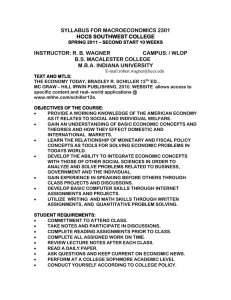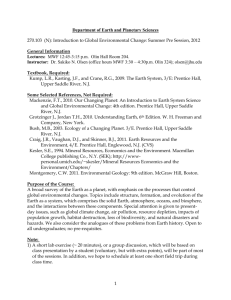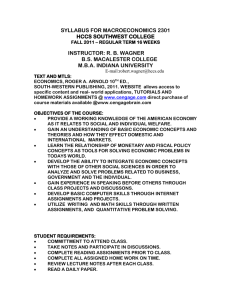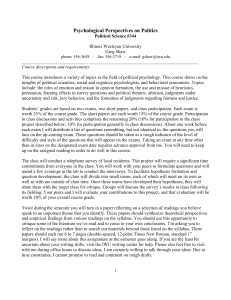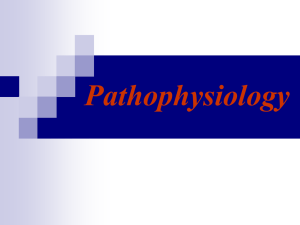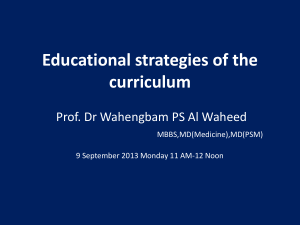SDSU School of Nursing Fall, 2014 Schedule Number: 22421
advertisement
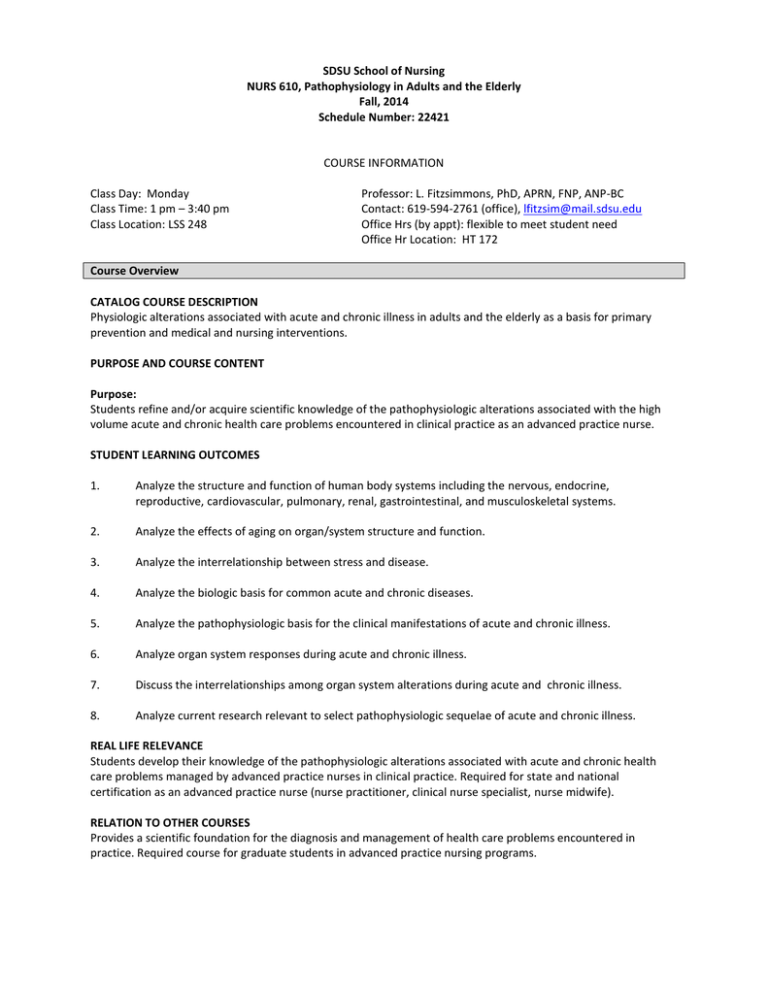
SDSU School of Nursing NURS 610, Pathophysiology in Adults and the Elderly Fall, 2014 Schedule Number: 22421 COURSE INFORMATION Class Day: Monday Class Time: 1 pm – 3:40 pm Class Location: LSS 248 Professor: L. Fitzsimmons, PhD, APRN, FNP, ANP-BC Contact: 619-594-2761 (office), lfitzsim@mail.sdsu.edu Office Hrs (by appt): flexible to meet student need Office Hr Location: HT 172 Course Overview CATALOG COURSE DESCRIPTION Physiologic alterations associated with acute and chronic illness in adults and the elderly as a basis for primary prevention and medical and nursing interventions. PURPOSE AND COURSE CONTENT Purpose: Students refine and/or acquire scientific knowledge of the pathophysiologic alterations associated with the high volume acute and chronic health care problems encountered in clinical practice as an advanced practice nurse. STUDENT LEARNING OUTCOMES 1. Analyze the structure and function of human body systems including the nervous, endocrine, reproductive, cardiovascular, pulmonary, renal, gastrointestinal, and musculoskeletal systems. 2. Analyze the effects of aging on organ/system structure and function. 3. Analyze the interrelationship between stress and disease. 4. Analyze the biologic basis for common acute and chronic diseases. 5. Analyze the pathophysiologic basis for the clinical manifestations of acute and chronic illness. 6. Analyze organ system responses during acute and chronic illness. 7. Discuss the interrelationships among organ system alterations during acute and chronic illness. 8. Analyze current research relevant to select pathophysiologic sequelae of acute and chronic illness. REAL LIFE RELEVANCE Students develop their knowledge of the pathophysiologic alterations associated with acute and chronic health care problems managed by advanced practice nurses in clinical practice. Required for state and national certification as an advanced practice nurse (nurse practitioner, clinical nurse specialist, nurse midwife). RELATION TO OTHER COURSES Provides a scientific foundation for the diagnosis and management of health care problems encountered in practice. Required course for graduate students in advanced practice nursing programs. 2 COURSE CONTENT, ASSIGNMENTS* *Required research and evidence based practice articles will be added 3 Date 8/25 Content Orientation, Stress physiology, Renal physiology Readings Text: chapts 11, 37 Study Guide: chapts 11, 37 9/1 9/8 University Holiday, Labor Day, No class Renal Pathophysiology 9/15 Endocrine pathophysiology Joan Fitzgerald, MSN, FNA VA Diabetic Nurse Practitioner 9/22 On-line BB assignment 9/29 Gastrointestinal physiology, pathophysiology 10/6 10/13 EXAM I Pulmonary pathophysiology 10/20 Pulmonary pathophysiology, Acid Base Text: chapt 34, 35 Study Guide: chapt 35 10/27 Cardiovascular pathophysiology ASCVD, ACS, Dyslipidemia, HTN Text: chapts 31, 32 Study Guide, chapts 31, 32 Desani, pp. 237-244 11/3 Cardiovascular pathophysiology Chronic Heart Failure (CHF) Dr. Beverly Carlson Text: Chapts 31, 32 Study Guide, chapts 31, 32 Desani, pp. 237-244 11/10 11/17 EXAM II Neurologic physiology & pathophysiology 11/24 Neurologic pathophysiology (con’t) Text: chapts 38 Study Guide: chapt 38 Desani, pp. 153-183 Text: chapts 21, 22 Study Guide, chapts 21, 22 Desani, pp. 190-200 Text: 40, 41 Study Guide, chapt 40, 41 Desani, pp. 212-218 Text: 34, 35 Study Guide: chapt 34, 35 Text: Chapts 15, 18, 17, Study Guide, chapt 15, 17, 18 Text: chapts 43, 44 Study Guide: chapts 43, 44 Musculoskeletal pathophysiology 12/1 Musculoskeletal pathophysiology (con’t) Reproductive pathophysiology Text: chapts 23, 24 Study Guide: chapts 23, 24 12/8 Reproductive pathophysiology Sexually Transmitted Diseases Text: chapt 26 Study Guide, chapt 26 12/15 EXAM III (Comprehensive) Enrollment Information Admission to one of the following Graduate Concentration/Specializations: 4 Advanced Practice Nursing (APN) of Adults/Elderly: NP-CNS; APN or CNS-NE; Nursing Education: Adult Health; Midwifery; Women's Health Care NP; Midwifery & Women's Health Care NP. Enrollment should follow a student’s 2 or 3-yr curriculum sequence. Any deviation requires approval of course faculty. Open to SON graduate students with course faculty consent. ADD/DROP PROCEDURES Per University policy in the SDSU General Catalog and class schedule Course Materials Course materials (syllabus, lecture outlines, course documents etc.) are accessible via the course Blackboard site. REQUIRED BOOKS McCance, K. L., & Huether, S. E. (2014). Study guide and workbook. Pathophysiology: The biologic basis for disease in adults and children (7th ed.). Elsevier Mosby: St. Louis. McCance, K. L., & Huether, S. E. (2014). Pathophysiology: The biologic basis for disease in adults and children (7th ed.). Elsevier Mosby: St. Louis. DeSani, S. (2009). Clinicians guide to laboratory medicine. MD2B: Houston, Texas Current evidence-based practice guidelines, research studies, and risk assessment tools will be introduced as a foundation for clinical practice. Course Structure and Conduct Both lecture and discussion formats are used. Students become familiar with relevant professional literature and current research associated with the topics discussed. Students are expected to complete all assignments as minimal preparation for class. Class time will be spent discussing the high volume pathophysiologic alterations encountered by advanced clinicians. Students are expected to self-study normal anatomy and physiology pertaining to each body system. Students will critique research and will be introduced to evidence-based clinical practice guidelines that form the basis of clinical practice. This course is designed to help students synthesize content in three advanced practice core courses, pathophysiology (NURS 610), pharmacology (NURS 658), and advanced health assessment and health promotion (NURS 501). Therefore corresponding content will become a domain in this class. Computer Requirements: Students are required to have a computer with internet access, a printer and an active SDSU email account. Students are responsible for checking their email daily and responding promptly when requested to do so. Course Assessment and Grading Student achievement is evaluated by in-class exams. Exams are closed book timed tests that consist of both objective (multiple choice, short answer, matching) and essay type test questions. To successfully complete the course a student must earn a grade of C or greater. Final course grades will be determined by achievement in the following areas: Exam I (80 points) Exam II (80 points) Exam III (80 points) Total number of points (240) 33 1/3% of course grade 33 1/3% of course grade 33 1/3% of course grade 100% Points will be deducted for tardiness, early departures and absences as specified by course policies. Final course grades are based on the following plus/minus scale: 5 Total Points 222-240 215-221 208-214 198-207 191-197 184-190 174-183 167-173 160-166 150-159 143-149 <143 Final % 93-100% 90-92% 87-89% 83-86% 80-82% 77-79% 73-76% 70-72% 67-69% 63-66% 60-62% 60% Final Course Grade A AB+ B BC+ C (Lowest grade to pass the course) CD+ D DF Other Course Policies Class Attendance: Class attendance is MANDATORY. Students should not make outside commitments that require absence from class. Work schedule conflicts do NOT justify an excused absence. If it becomes necessary to miss class, the student must email the course professor before class and request an excused absence. For a class absence to be excused, the student must provide written documentation justifying the absence as an emergency. Excused absences will only be granted for emergency situations as determined by the course professor. Documentation should be submitted before the next scheduled class meeting. Failure to provide timely appropriate documentation will result in an unexcused absence. Evidence of falsifying documents will be treated as academic dishonesty and will be subject to University sanctions and may include dismissal from the University. One unexcused absence will result in lowering of the student’s final course grade by one interval. For example: A to A-, B+ to B, or C to C- etc. Two unexcused absences will result in course failure. There will be no exceptions to this policy. No provisions will be made for an examination that is missed because of an unexcused absence. An unexcused absence will result in 0 points for the exam. There are no makeup exams for unexcused absences. For an absence to be excused, the student must provide appropriate timely written documentation as previously described. If a make-up exam is needed for an excused absence, the exam may differ in format from the original exam (e.g, essay, short answer, oral exam or other test formats maybe given). The date, time, place and composition of the makeup exam will be determined by course professor. Excessive absences (even if excused) may result in course failure. Please contact the course professor if you are having problems that affect your attendance in lecture. Tardiness: Students are expected to be on time for class. Late arrivals or early departures are disruptive and discourteous to faculty, guest lecturers, and peers. Class tardiness and early departures may result in a lowering of the course grade or in course failure. Tardiness and early departures will result in final grade point deductions as follows: 5-30 minutes late = 1 point penalty; 31-59 minutes late = 2 point penalty; 60 minutes or more (late) or early departure = 5 point penalty. More than 10 penalty points for tardiness will result in course failure. Students who leave class early or don't return after break are subject to the loss of points. Classroom Etiquette: Electronic devices (computers, iphones, ipads etc.) may only be used to access course materials. These devices may NOT be used to send/receive/check messages or texts during class time. Cell phones should be silenced and text messaging is not permitted during class time. Lectures may NOT be recorded. Students with Disabilities: Students who need disability accommodations should provide documentation of their disabilities to Student Disability Services (DSS) (Capulli Center, Suite 3101), and receive authorization for academic accommodations. After accommodations have been authorized by DSS, students are responsible for notifying course professor in advance of the need for accommodations. This can be best accomplished by making an 6 appointment to meet privately with the course professor early in the semester, or as soon as possible in the event that a disability is diagnosed during the course of the semester. Program Progression: Please refer to the current SDSU Graduate Bulletin regarding course grades. APN, NP-CNS; Midwifery and Women's Health Care NP; Women's Healthcare NP and Midwifery students must successfully complete NURS 610 to enroll in NURS 654. APN, CNS-NE students must successfully complete NURS 610 to enroll in NURS 751/753. Nursing Education-Adult Health must successfully complete NURS 501, 610 and 658 before enrolling in NURS 751 or 646. Other: "Some courses may require students to participate in field trips, research or studies that include course work that will be performed off-campus. Participation in such activities may result in accidents or personal injury. Students participating in off-campus are aware of these risks, and agree to hold harmless San Diego State University, the State of California, the Trustees of the California State University and Colleges and its officers, employees and agents against all claims, demands, suits, judgments, expenses and costs of any kind on account of their participation in the activities. Students using their own vehicles to transport other students to such activities should have current automobile insurance. "
